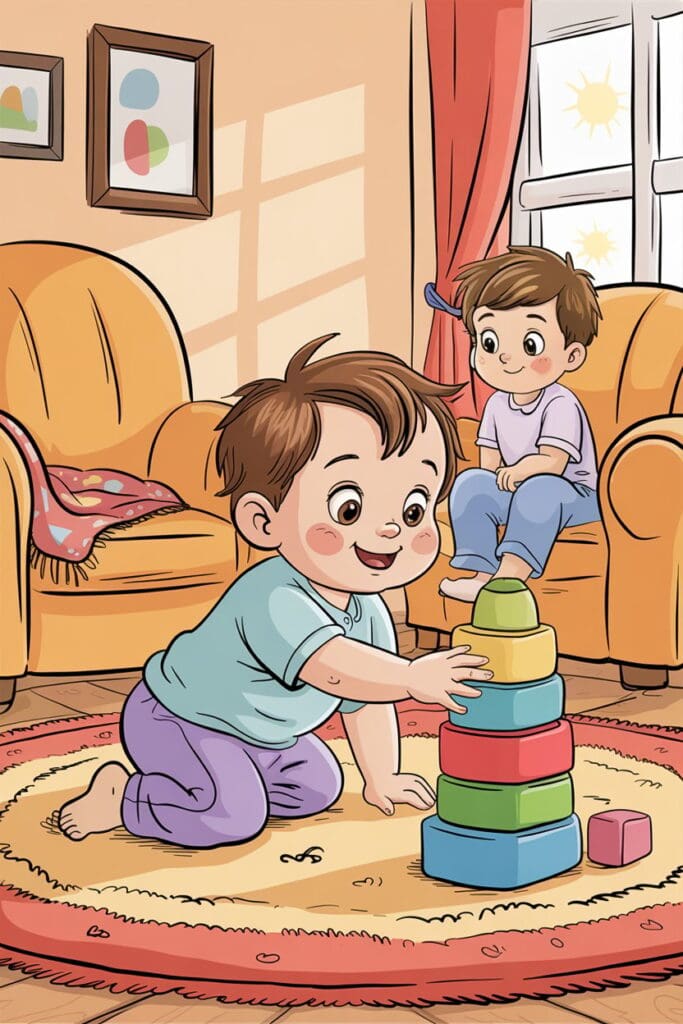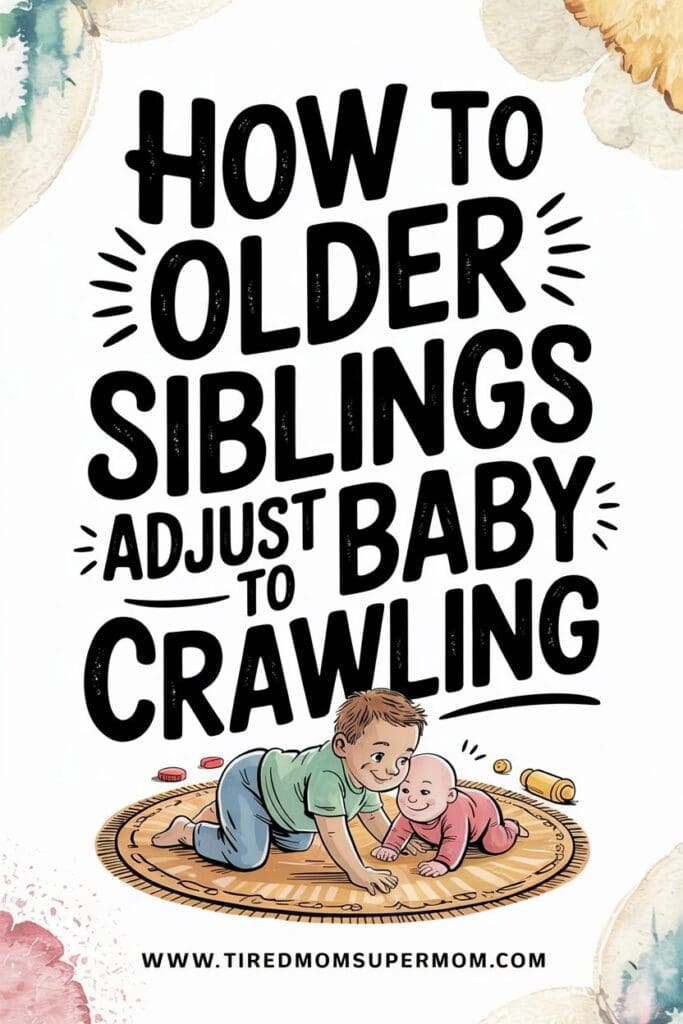How to Help Older Siblings Adjust to Baby Crawling: 7 Gentle Parenting Tips
As a mom of three, I’ve been through the rollercoaster of introducing a new baby to older siblings.
Helping older siblings adjust to baby crawling can feel overwhelming, especially when your older child is used to having their own space.
As the baby becomes more mobile and curious, emotions can run high—jealousy, frustration, even a little regression.
When my youngest daughter Sophie started crawling, my oldest suddenly became territorial about everything—from the living room rug to the remote control. One day, he said, “Why is she allowed to touch my things?” That moment helped me realize this was less about toys—and more about space, identity, and feeling seen. That’s when we started giving him his own “big sibling” missions. The change was almost instant.
In this post, you’ll find simple, real-life strategies to ease the transition, create a peaceful home, and support both your older child and your crawling baby with confidence.
Heads up: This post may include affiliate links. As an Amazon Associate, I earn from qualifying purchases—at no extra cost to you. Full privacy policy and disclosure here.

1. Prepare them in advance
Before the baby arrives, talk to your older child about the upcoming addition to the family. This helps them mentally prepare for the change and reduces the element of surprise.
2. Read books about new siblings together
Choose age-appropriate books that discuss the arrival of a new baby. Reading these books together can open up discussions and help your child understand what to expect.
3. Visit friends or relatives with newborns
Spending time around other babies can familiarize your older child with the sights and sounds of infants, making the arrival of their own sibling less intimidating.
4. Discuss their role as a big brother or sister
Talk to your older child about their important role as a big brother or sister. Emphasize how they can help and teach them about their responsibilities.
5. Include them in baby-related decisions
Involve your older child in decisions related to the baby, such as choosing a name or picking out nursery decor. This gives them a sense of ownership and importance.
For more insights on nurturing sibling relationships, explore our guide on Positive Parenting Strategies.
6. Keep routines as consistent as possible
Maintain your older child’s daily routines as much as possible to provide stability and reassurance during the period of adjustment.
7. Plan special one-on-one time with the older sibling
Allocate regular one-on-one time with your older child to reassure them that they are still loved and valued.
“The arrival of a mobile sibling can feel like a threat to an older child’s role in the family. Helping them feel included in the baby’s milestones is key to reducing rivalry.”
— Dr. Laura Markham, Clinical Psychologist & Parenting Expert
8. Praise them for being a great older sibling
Acknowledge and praise your older child for their efforts in taking care of the new baby. Positive reinforcement can boost their self-esteem.
9. Share baby photos from when they were born
Show your older child their baby photos and share stories about their own infancy to help them relate to the new baby.
10. Explain that babies require a lot of care and attention
Help your older child understand that babies need constant care and attention, which may temporarily limit the time you spend with them.
According to the Child Mind Institute, involving older children in baby care can ease the transition.
11. Let them feel the baby’s movements during pregnancy
Allow your older child to gently touch your belly to feel the baby’s movements, involving them in the pregnancy experience.
12. Let them help with baby preparations
Include your older child in preparing for the baby’s arrival, such as folding baby clothes or organizing baby supplies.
One of the biggest parenting challenges is figuring out how to help older siblings adjust to baby crawling without causing jealousy or resentment.
13. Buy them a gift “from the baby”
Consider giving your older child a small gift from the new baby as a gesture of sibling bonding.
14. Let them choose a small gift for the baby
Allow your older child to pick out a gift for the new baby. This fosters a sense of connection and ownership.
To help older siblings adjust to baby crawling, set clear boundaries and include them in baby-proofing activities.
15. Show them ultrasound images of the baby
Share ultrasound images with your older child, explaining that these pictures show their future sibling growing inside mommy’s tummy.
The American Academy of Pediatrics offers additional tips on preparing siblings for a new baby.
16. Watch videos of siblings bonding
Watch videos or movies with your older child that depict positive sibling relationships to illustrate the joys of having a sibling.
17. Teach them about gentle touch and handling
Show your older child how to gently touch and handle the baby, emphasizing the importance of being gentle and careful.
18. Show them how to hold the baby with supervision
Once the baby arrives, teach your older child how to hold their new sibling under your supervision, promoting bonding and responsibility.
19. Encourage them to talk or sing to the baby in the womb
Encourage your older child to talk or sing to the baby in your belly, helping them feel connected even before birth.
This shift in family dynamics is a great opportunity to help older siblings adjust to baby crawling through empathy and shared play.
20. Allow them to be present at the birth if they’re interested
If your older child expresses interest in being present at the birth, consider involving them in a way that is appropriate for their age and comfort level.

21. Explain how babies communicate
Discuss with your older child how babies communicate through crying, sleeping, and other cues, so they can better understand the baby’s needs.
22. Arrange for them to meet the baby as soon as possible
Try to introduce your older child to the baby as soon as possible after birth to begin the bonding process.
If you’re wondering how to help older siblings adjust to baby crawling, the key is preparation and consistent communication.
23. Let them help with baby’s first bath
Under your close supervision, involve your older child in giving the baby their first bath to create a sense of shared responsibility.
24. Share stories about their own babyhood
Talk to your older child about their own babyhood, sharing memories and experiences from when they were little.
25. Express love and affection toward the older sibling
Continue to show love and affection to your older child to reassure them of their place in your heart.
Many parents find it difficult to help older siblings adjust to baby crawling when routines are disrupted or attention is divided.
26. Remind them that they are still special and loved
Frequently remind your older child that they are unique and loved, despite the new addition to the family.
27. Involve them in diaper-changing and feeding
When age-appropriate, involve your older child in tasks like diaper-changing and feeding under your guidance.
Try using role-play games to help older siblings adjust to baby crawling while making them feel included and important.
28. Allow them to choose baby’s outfits
Let your older child pick out the baby’s outfits sometimes, making them feel like a part of caring for the new arrival.
29. Create a special “big sibling” space in the nursery
Designate an area in the nursery where your older child can have their special belongings or a place to spend time with the baby.
30. Encourage drawing or crafting for the baby
Encourage your older child to create artwork or crafts as gifts for the baby, fostering a sense of involvement and creativity.
You can help older siblings adjust to baby crawling by giving them their own ‘big kid’ jobs to encourage leadership and bonding.
31. Share responsibilities in baby care
Divide caregiving responsibilities between parents and involve your older child in age-appropriate tasks.
32. Organize playdates for the older sibling
Arrange playdates with friends or family members of a similar age to give your older child opportunities to socialize and have fun.
33. Arrange for outings with just the older sibling
Occasionally plan outings or activities that are exclusively for your older child to strengthen your bond.
34. Have a family meeting to discuss any concerns
Hold family meetings where everyone can share their feelings and concerns about the new addition, creating an open and supportive environment.
35. Read books together about sibling relationships
Explore books that focus on positive sibling relationships to encourage discussion and understanding.
When you actively help older siblings adjust to baby crawling, you’re laying the groundwork for a more peaceful sibling relationship.
36. Celebrate milestones and achievements together
Acknowledge and celebrate your older child’s achievements and milestones to show that their accomplishments still matter.
37. Let them choose a bedtime story for the baby
Involve your older child in bedtime routines by allowing them to choose a story to read to the baby.
38. Encourage them to talk about their feelings
Create a safe space for your older child to express their emotions and talk about their feelings regarding the new baby.
39. Be patient and understanding during challenging times
Recognize that adjusting to a new sibling can be challenging for your older child, and be patient and understanding during difficult moments.
40. Create a baby scrapbook or photo album together
Start a scrapbook or photo album that includes memories of both the older child and the new baby, highlighting their journey together.
41. Teach them to gently sing lullabies to the baby
Encourage your older child to sing gentle lullabies to the baby, promoting a nurturing bond between them.
Our favorite lullabies were
- twinkle twinkle little star
- Baa Baa Black Sheep
- Row Your Boat
42. Arrange playtime with other families who have newborns
Set up playdates with families who also have newborns, allowing your older child to interact with other siblings in similar situations.
43. Offer rewards for helpful behavior
Provide positive reinforcement by offering rewards or incentives for helpful and caring behavior toward the new baby.
44. Allow them to be the “helper” when needed
Empower your older child by letting them assist with tasks related to the baby, making them feel important and capable.
45. Give them opportunities for alone time with each parent
Ensure your older child still has quality one-on-one time with each parent to maintain their sense of connection and importance.
You can connect through questions like these!
- 320+ Animal Riddles For Children
- 20 Super Fun Apple Facts Kids Love To Know
- 142 Fun Questions To Ask Kids
- 270 Never Have I Ever Questions For Kids!
46. Organize family outings to special places
Plan family outings to places your older child loves, creating memorable experiences together.
47. Reassure them that their needs will be met too
Let your older child know that their needs and desires are still important and will be met even with the new baby in the family.
48. Share stories about your own sibling experiences
Share stories from your own childhood about your experiences with siblings, which can help your child relate.
49. Play games that involve the whole family
Engage in family games and activities that promote bonding and togetherness.
50. Celebrate each sibling’s unique qualities and talents
Encourage and celebrate the unique qualities and talents of each child, reinforcing their individuality and value within the family.
Want a simple way to ease the transition? Grab your free Big Sibling Support Checklist below and keep it handy on the fridge!
❓ FAQ
How can I help my older child feel included when the baby starts crawling?
Involve them in baby-proofing tasks and celebrate their role as a big sibling. This inclusion fosters responsibility and reduces feelings of jealousy.
What are signs that my older child is struggling with the baby’s mobility?
Look for behavioral changes such as increased tantrums, regression in toilet training, or withdrawal. These may indicate they need more attention and reassurance.
How do I balance attention between my crawling baby and older child?
Schedule dedicated one-on-one time with your older child daily, even if it’s brief. This consistency reinforces their importance in the family.
Are there activities that both my crawling baby and older child can enjoy together?
Yes, supervised play activities like building blocks or simple musical games can be enjoyable for both, promoting bonding and shared experiences.
Should I involve my older child in the baby’s crawling milestones?
Absolutely. Encouraging your older child to cheer on the baby or assist in safe play can strengthen their sibling bond and reduce rivalry
🛒 Amazon Affiliate Product Recommendations
Enhance your content with these relevant affiliate products:
- Safety 1st Outlet Cover with Cord Shortener
Keep cords out of reach to protect your crawling baby. Buy on Amazon - Regalo Easy Step Walk Thru Baby Gate
A sturdy gate to keep your baby safe and give your older child their own space. Buy on Amazon - Melissa & Doug Mine to Love Jenna Doll
A perfect gift for your older child to mimic caring for a baby. Buy on Amazon - Skip Hop Silver Lining Cloud Baby Play Mat
Engaging play mat for your baby, allowing your older child to participate in supervised play. Buy on Amazon
Final Thoughts on Helping Older Siblings Adjust to Baby Crawling
Navigating the early stages of baby mobility can be a big shift for the entire family—especially older siblings. By offering reassurance, encouraging inclusion, and setting clear boundaries, you can help older siblings adjust to baby crawling in a way that strengthens their bond rather than causing conflict. This transition offers a beautiful opportunity to nurture empathy, cooperation, and confidence in your older child.
Remember, your support and understanding make all the difference. Want more positive parenting tips and real-life tools? Be sure to check out Positive Parenting Solutions — I personally recommend it as a game-changer in navigating sibling dynamics!
📌 Loved these tips? Save this for later!
If you’re in the thick of helping older siblings adjust to baby crawling, be sure to Pin this post so you can come back to it anytime you need a little parenting backup.

